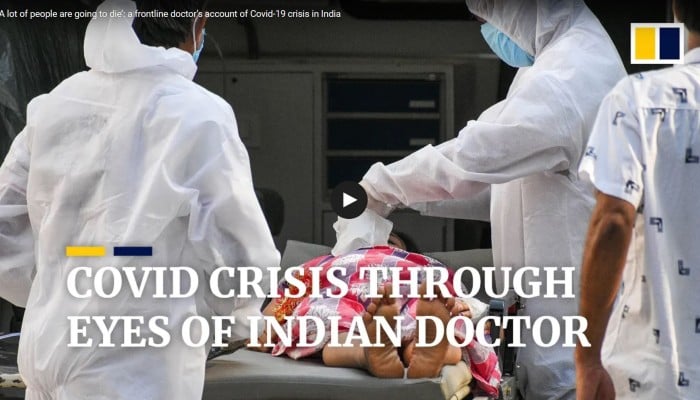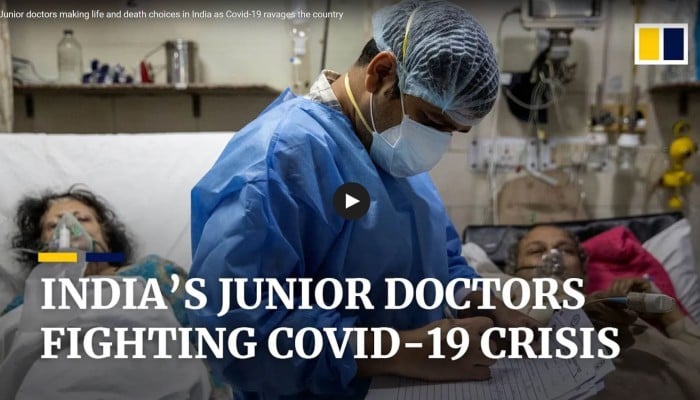The South China Morning Post joins the news community around the world to celebrate press freedom. Your support is vital in helping safeguard quality journalism.
Hello there,
The world’s attention is on India this month as it struggles with a catastrophic second wave of Covid-19 infections.
Emergency medical aid from the rest of the world is pouring into the country at a level not seen since the 2004 Boxing Day tsunami. The resounding response is commendable, but as a whole, cooperation among the community of nations has been a mixed bag since the global pandemic began.
In this edition of Global Impact, Bhavan Jaipragas, our senior Asia correspondent, will examine how countries have fared in assisting others – and accepting much needed help – in this crisis of a generation.
All the best,
John Carter
Senior Editor, Political Economy
The China-India relationship has not exactly been balmy of late, with tensions spiking with increasing regularity over the two countries’ disputed border and New Delhi’s involvement in the US-led Quad arrangement.
Nonetheless, Beijing has shown it is ready to put aside these prickly issues to offer India the help it needs as the South Asian nation’s Covid-19 disaster worsens. In India, that olive branch has been met in some quarters with scepticism, with cynics wondering if China’s outreach contained a “hidden agenda”.
This was put on display with the lack of Indian participation in a recent conference call on coordinating emergency supplies between the Chinese Foreign Minister Wang Yi and counterparts from South Asian nations Afghanistan, Pakistan, Nepal, Sri Lanka and Bangladesh.
India’s standoffishness towards China’s helping hand is not isolated; across Asia, China’s widening vaccine diplomacy has been met with varying degrees of suspicion.
In Singapore, for example, the arrival in February of China-made Sinovac vaccines before they had received domestic approval raised questions about whether the shipment was a tacit form of “pressure” from Beijing for the city state to quickly green light the jabs.
Observers say there is greater appreciation for China’s efforts among developing economies, which are bearing the brunt of rich nations’ vaccine nationalism. Figures compiled by the Post in early April showed China had by then shipped more than 80 million ready made vaccine doses overseas.Recipients include the tiny South American country Guyana, landlocked Laos in Southeast Asia, and Zimbabwe in Africa.
A major challenge for China’s vaccine diplomacy has been confusion over the efficacy data surrounding its jabs.
The new release of data and assessments by the World Health Organization will go some way in quelling these concerns, but there remain doubts about the Chinese vaccines’ safety and efficacy for high-risk groups and the elderly.
Political watchers say the decision by foreign governments – namely Malaysia, Indonesia and the United Arab Emirates – to begin domestic production of Chinese vaccines is an important shot in the arm for Beijing’s vaccine diplomacy effort.
In Indonesia, the joint efforts have been portrayed as an important step in combating the global “vaccination divide”.
For now, what is clear is that countries, especially in Asia, cannot afford to stand alone. Fierce new Covid-19 waves are enveloping other developing countries across the region, placing severe strain on their health care systems and prompting appeals for help.
The US this week appeared to be taking a step in the right direction in this regard, signalling it will back an Indian and South African initiative to waive intellectual property protections for Covid-19 vaccines.
As the Chinese international relations professor Zha Daojiong put it recently, major powers the US and China would do well to step up their vaccine diplomacy in tandem with each other. The real battle for benefactor nations is to not to outdo one another, but to act quickly to save lives.
- South China Morning Post, SCMP -
Hello there,
The world’s attention is on India this month as it struggles with a catastrophic second wave of Covid-19 infections.
Emergency medical aid from the rest of the world is pouring into the country at a level not seen since the 2004 Boxing Day tsunami. The resounding response is commendable, but as a whole, cooperation among the community of nations has been a mixed bag since the global pandemic began.
In this edition of Global Impact, Bhavan Jaipragas, our senior Asia correspondent, will examine how countries have fared in assisting others – and accepting much needed help – in this crisis of a generation.
All the best,
John Carter
Senior Editor, Political Economy
The China-India relationship has not exactly been balmy of late, with tensions spiking with increasing regularity over the two countries’ disputed border and New Delhi’s involvement in the US-led Quad arrangement.
Nonetheless, Beijing has shown it is ready to put aside these prickly issues to offer India the help it needs as the South Asian nation’s Covid-19 disaster worsens. In India, that olive branch has been met in some quarters with scepticism, with cynics wondering if China’s outreach contained a “hidden agenda”.
This was put on display with the lack of Indian participation in a recent conference call on coordinating emergency supplies between the Chinese Foreign Minister Wang Yi and counterparts from South Asian nations Afghanistan, Pakistan, Nepal, Sri Lanka and Bangladesh.
India’s standoffishness towards China’s helping hand is not isolated; across Asia, China’s widening vaccine diplomacy has been met with varying degrees of suspicion.
In Singapore, for example, the arrival in February of China-made Sinovac vaccines before they had received domestic approval raised questions about whether the shipment was a tacit form of “pressure” from Beijing for the city state to quickly green light the jabs.
Observers say there is greater appreciation for China’s efforts among developing economies, which are bearing the brunt of rich nations’ vaccine nationalism. Figures compiled by the Post in early April showed China had by then shipped more than 80 million ready made vaccine doses overseas.Recipients include the tiny South American country Guyana, landlocked Laos in Southeast Asia, and Zimbabwe in Africa.
A major challenge for China’s vaccine diplomacy has been confusion over the efficacy data surrounding its jabs.
The new release of data and assessments by the World Health Organization will go some way in quelling these concerns, but there remain doubts about the Chinese vaccines’ safety and efficacy for high-risk groups and the elderly.
Political watchers say the decision by foreign governments – namely Malaysia, Indonesia and the United Arab Emirates – to begin domestic production of Chinese vaccines is an important shot in the arm for Beijing’s vaccine diplomacy effort.
In Indonesia, the joint efforts have been portrayed as an important step in combating the global “vaccination divide”.
For now, what is clear is that countries, especially in Asia, cannot afford to stand alone. Fierce new Covid-19 waves are enveloping other developing countries across the region, placing severe strain on their health care systems and prompting appeals for help.
The US this week appeared to be taking a step in the right direction in this regard, signalling it will back an Indian and South African initiative to waive intellectual property protections for Covid-19 vaccines.
As the Chinese international relations professor Zha Daojiong put it recently, major powers the US and China would do well to step up their vaccine diplomacy in tandem with each other. The real battle for benefactor nations is to not to outdo one another, but to act quickly to save lives.
|
Was this newsletter forwarded to you? Subscribe here
|

|
|
|
|
|
8 May 2021 |
|
Hello there,
The world’s attention is on India this month as it struggles with a catastrophic second wave of Covid-19 infections.
Emergency medical aid from the rest of the world is pouring into the country at a level not seen since the 2004 Boxing Day tsunami. The resounding response is commendable, but as a whole, cooperation among the community of nations has been a mixed bag since the global pandemic began.
In this edition of Global Impact, Bhavan Jaipragas, our senior Asia correspondent, will examine how countries have fared in assisting others – and accepting much needed help – in this crisis of a generation.
All the best,
John Carter
Senior Editor, Political Economy
The China-India relationship has not exactly been balmy of late, with tensions spiking with increasing regularity over the two countries’ disputed border and New Delhi’s involvement in the US-led Quad arrangement.
Nonetheless, Beijing has shown it is ready to put aside these prickly issues to offer India the help it needs as the South Asian nation’s Covid-19 disaster worsens. In India, that olive branch has been met in some quarters with scepticism, with cynics wondering if China’s outreach contained a “hidden agenda”.
This was put on display with the lack of Indian participation in a recent conference call on coordinating emergency supplies between the Chinese Foreign Minister Wang Yi and counterparts from South Asian nations Afghanistan, Pakistan, Nepal, Sri Lanka and Bangladesh.
India’s standoffishness towards China’s helping hand is not isolated; across Asia, China’s widening vaccine diplomacy has been met with varying degrees of suspicion.
In Singapore, for example, the arrival in February of China-made Sinovac vaccines before they had received domestic approval raised questions about whether the shipment was a tacit form of “pressure” from Beijing for the city state to quickly green light the jabs.
Observers say there is greater appreciation for China’s efforts among developing economies, which are bearing the brunt of rich nations’ vaccine nationalism. Figures compiled by the Post in early April showed China had by then shipped more than 80 million ready made vaccine doses overseas.
Recipients include the tiny South American country Guyana, landlocked Laos in Southeast Asia, and Zimbabwe in Africa.
A major challenge for China’s vaccine diplomacy has been confusion over the efficacy data surrounding its jabs.
The new release of data and assessments by the World Health Organization will go some way in quelling these concerns, but there remain doubts about the Chinese vaccines’ safety and efficacy for high-risk groups and the elderly.
Political watchers say the decision by foreign governments – namely Malaysia, Indonesia and the United Arab Emirates – to begin domestic production of Chinese vaccines is an important shot in the arm for Beijing’s vaccine diplomacy effort.
In Indonesia, the joint efforts have been portrayed as an important step in combating the global “vaccination divide”.
For now, what is clear is that countries, especially in Asia, cannot afford to stand alone. Fierce new Covid-19 waves are enveloping other developing countries across the region, placing severe strain on their health care systems and prompting appeals for help.
The US this week appeared to be taking a step in the right direction in this regard, signalling it will back an Indian and South African initiative to waive intellectual property protections for Covid-19 vaccines.
As the Chinese international relations professor Zha Daojiong put it recently, major powers the US and China would do well to step up their vaccine diplomacy in tandem with each other. The real battle for benefactor nations is to not to outdo one another, but to act quickly to save lives.
|
|
|
|
|
|

|
|
‘Violated through my nose’: Indonesian firm recycled Covid-19 tests
|
| • |
Kimia Farma, a state-owned pharmaceutical firm, is accused of washing and repacking cotton swabs that were used at a Medan airport | | | • | Police say workers may have earned up to US$125,000 in the ruse that has potentially affected 9,000 travellers since December
|
|
|
A pair of Indonesian lawyers are planning to sue a state-owned pharmaceutical firm after it was discovered to have allegedly reused nasal swabs for coronavirus tests for thousands of people. Last week, police arrested five workers at Kimia Farma, including its Medan business manager, who were accused of washing and repacking cotton swabs at the company’s main office in the city, and then sending them to Kualanamu International Airport where they were used on unsuspecting travellers. Read more
|
|
|
|

|
|
|
|
|

|
|
As India’s Covid-19 surge hits embassies, Modi’s image abroad suffers
|
| • |
Diplomats have not been spared the wave of infections sweeping the country. With hospitals overwhelmed, some have made public appeals for assistance | | | • | This has embarrassed the image conscious government, still smarting from criticism that it fed the crisis by allowing festivals and political rallies
|
|
|
Last week, a senior Tanzanian diplomat in New Delhi died from Covid-19 after he was refused admission by an overwhelmed city hospital and emergency treatment at an army hospital could not save him. Days later, the Philippine and New Zealand high commissions made an appeal on social media for bottled oxygen amid a nationwide shortage of medical supplies and hospital beds. Some diplomats from a Middle Eastern country have left India in the past 10 days, with one still in Delhi, who asked not to be identified, saying it was “simpler” for them to do so rather than remain in India’s capital. Read more
|
|

|
|
|

|
|
Pressure grows to scrap patent protections for Covid-19 vaccines
|
| • |
The World Trade Organization is considering a proposal to waive intellectual property rights amid a surge in cases in India | | | • | Pressure is mounting on world leaders to back the moves and there are signs that the US is seriously considering the proposal
|
|
|
Pressure is mounting for world leaders to waive intellectual property protections on Covid-19 vaccines in a bid to increase global production. On Friday the World Trade Organization debated a proposal that would temporarily waive protections on patents, copyrights, and industrial designs for products to fight Covid-19, which was first put before the body by South Africa and India in October. Read more
|
|

|

|
|
|

|
|
China’s global plan to vaccinate citizens hit by production problems
|
| • |
About 200,000 Chinese nationals overseas had been vaccinated under the Spring Seedling Action programme as of last month | | | • | But country does not have enough production capacity to satisfy both domestic and international demand, academic says
|
|
|
China’s drive to vaccinate its population with home-made Covid-19 jabs is not confined to its own borders, but has a unique twist in being extended to millions of citizens living in as many as 30 countries around the world. The so-called Spring Seedling Action programme was announced in March by Foreign Minister Wang Yi and had vaccinated about 200,000 Chinese nationals overseas as of early April in countries from neighbouring Laos to Lebanon in the Middle East and Africa’s Sierra Leone. Read more
|
|
|
To keep track of the latest global news developments, follow our daily coverage on our main website, or focus on stories about Covid-19 developments worldwide here.
In our next issue, our tech desk will dig into the causes and impact of, and outlook for, the global semiconductor shortage.
We welcome your feedback. Email me at globalimpact@scmp.com or tweet me at @SCMPAsia. Plus, be sure to check out our Asia newsfeed for the latest news and analysis.
All the best,
Bhavan
|

|
|
Bhavan Jaipragas
Asia Correspondent
|
|
|
|
|
|
| SCMP NEWSLETTERS THAT MAY INTEREST YOU |

China at a Glance
A wealth of insights giving you the inside story on China every day.
China Economic Update
The latest developments from trade relations to growth rates and other key economic data.
Inside China Tech
Our weekend newsletter covering the biggest stories and updates from the tech centres of China.
VIEW AND SIGN UP
|

|
|
|
Download our app
To get push notifications direct and never miss a story as it breaks
|
|
|
|
|
Hong Kong
China
Asia
World
Economy
Business
Tech
Comment
|
|
|
|
Copyright © 2021 South China Morning Post Publishers Ltd. All rights reserved.
|
|
This newsletter is created and catered for the global news reader. Each issue will feature a news story originating from China that carries a significant macro impact on the rest of the world.
We hope to share with you a broader perspective on the emerging topics shaping our world and that we feel are revolutionising the way we understand China.
|

















